How to make Quick Pickled Vegetables! A simple, delicious recipe that can be used with almost any veggie! Make pickled cucumbers, pickled carrots, beets, turnips, radishes, kohlrabi, onions, cauliflower, peppers, asparagus or green beans. (For long-term canning, see recipe notes.)
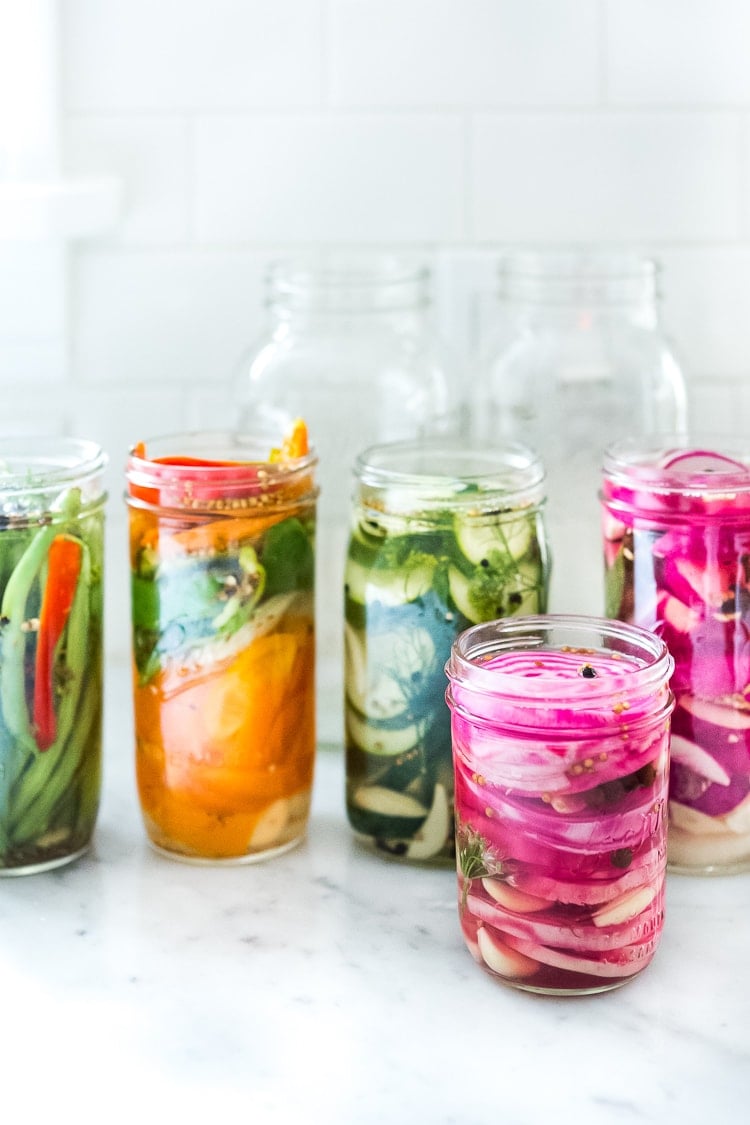
Here’s a simple recipe to help extend summer’s bounty well into fall. Our fridge has been bursting at the seams- full of so many beautiful vegetables we’ve been receiving through our CSA -that it was getting a little out of hand. I set some time aside to sort through all the drawers and gather up what could be preserved for later use.
Pickled Vegetables | 60-second video
What I love about Pickled Veggies
- The flavor. These quick-pickled vegetables are a little less vinegary by design. Sometimes I’ll get a hankering for a little snack and often turn to these pickled veggies because they taste great on their own, no need to bury them in a sandwich, which of course, you can always do too.
- Preserve the Veggies! One of the best parts of making pickled veggies is the joy and satisfaction it brings, knowing I saved the life of a vegetable before it was too late.
- Makes a great Hostess Gift! Bring a cute jar of quick pickled veggies as a hostess gift, such a treat!
What are the Best Vegetables to Pickle?
- Cucumbers
- Green beans
- Asparagus
- Baby Carrots
- Beets
- Salad Turnips
- Radishes
- Onions
- Chili Peppers and red bell peppers
- Zucchini and summer squash
Pickling Liquid
- Vinegar – white vinegar or white wine vinegar makes for the clearest color, but red wine vinegar, Apple cider vinegar, rice vinegar, or a combo will work.
- Water – to dilute the vinegar
- Salt – for flavor and to help preserve.
- Sugar- It helps to balance the vinegar flavor.
- Whole Spices – any of the following: coriander seeds, fennel seeds, mustard seeds, celery seeds, black peppercorns, allspice, clove, cumin seeds, dill seeds, star anise.
- Garlic cloves and Onion slices
- Fresh herbs– we love dill, but cilantro, basil works too.
See the recipe card for detailed measurements.
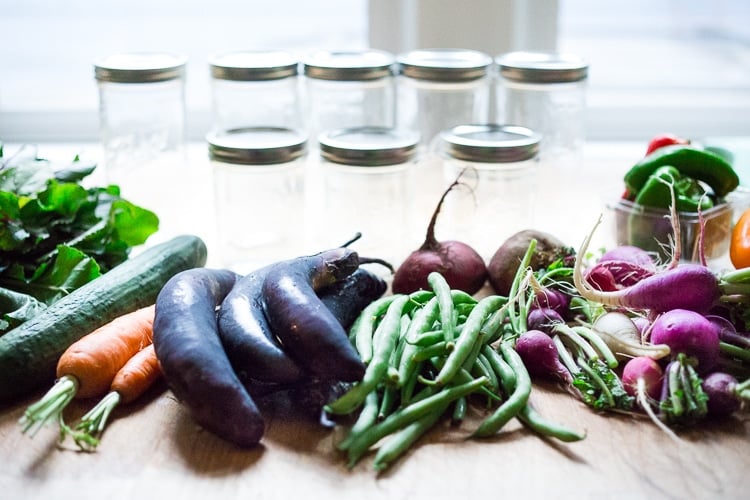
Optional Flavors and Variations
Play around and experiment with different spices and herbs.
- Whole Spices: Fennel seeds, Coriander, Cumin, Mustard, Anise Seed, Dill Seed, Peppercorns, Juniper Berries, Allspice, Whole Cloves, Star Anise,
- Aromatics: Onion, garlic, ginger, Turmeric root, Horseradish, lemon zest, orange zest, lime zest.
- Herbs: Dill, Parsley, Cilantro, Oregano, Basil, thyme, sage, rosemary, chives, scallions, bay leaves
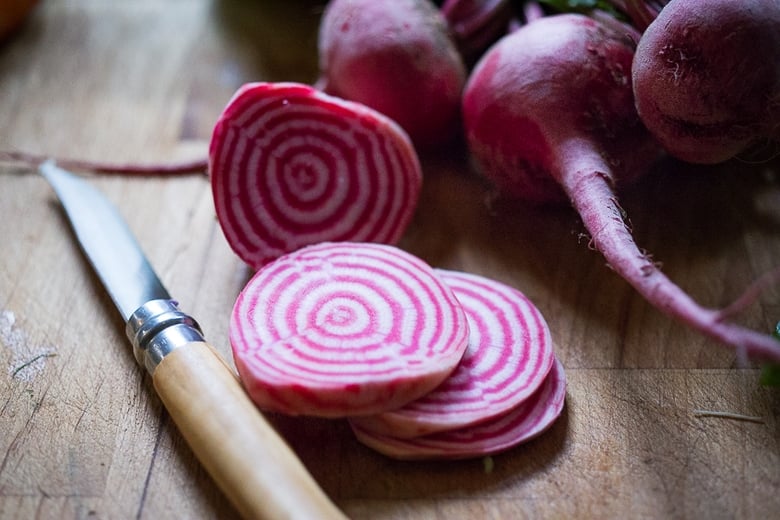
How to Pickle Vegetables!
Wash and prep your vegetables, taking the time to consider their beauty and perhaps how best to highlight their uniqueness. I wanted the colorful patterns of these Chioggia beets to really come through, so I sliced them very thinly, showing off their circles. This is the fun part!
Put on some good music and just create. It’s good for the soul!
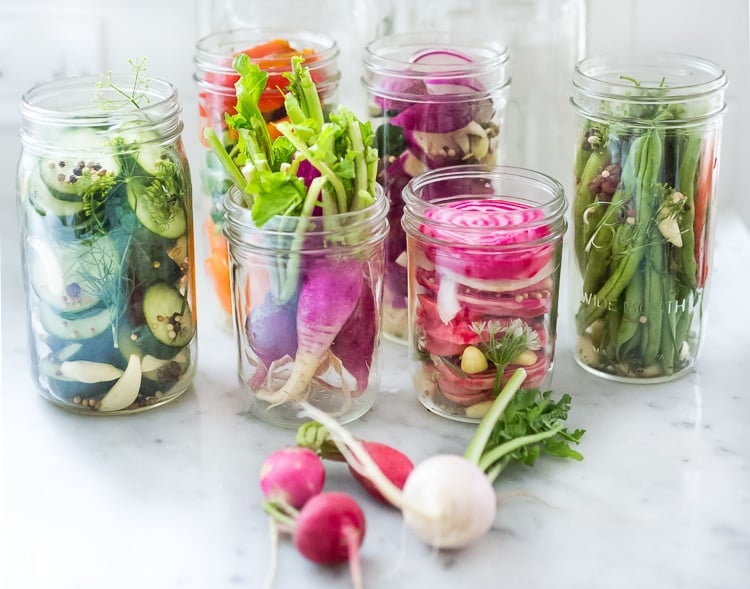
STEP ONE:
Begin filling up your mason jars with veggies, layering with whole spices, raw aromatics (onion, ginger, garlic) and herbs.
STEP TWO:
While you are filling the jars, heat the pickling liquid on the stove and bring it to a boil.
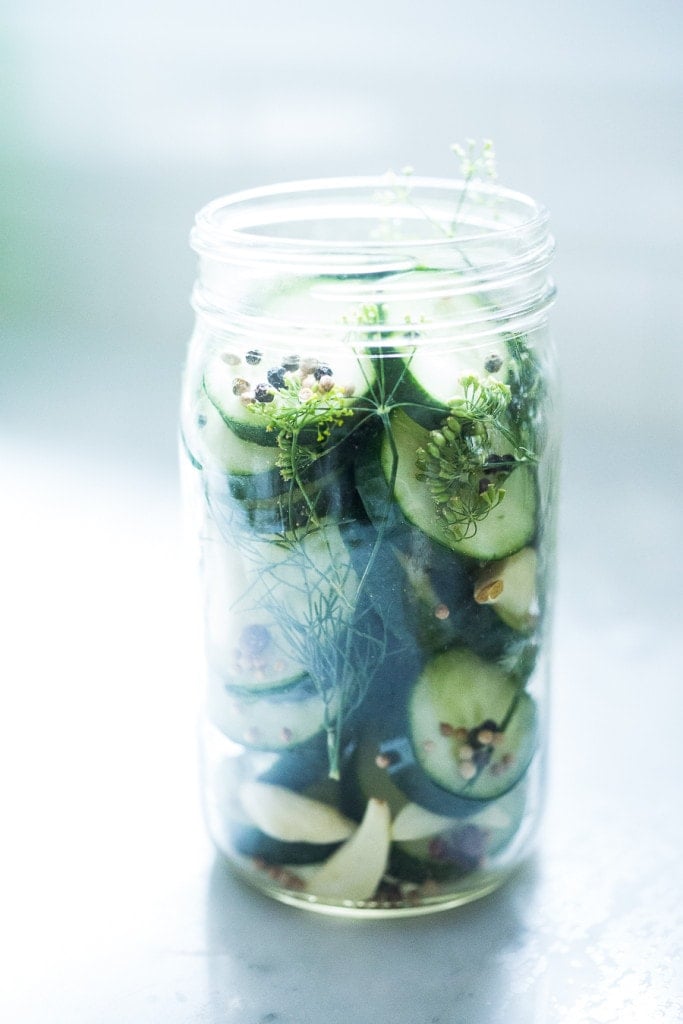
STEP THREE
Carefully pour hot the pickling liquid over the veggies, completely submerging. Leave about a ½-inch space between the top of the liquid and the lid.
STEP FOUR
Cool on the counter for a couple of hours before covering and placing the fridge.
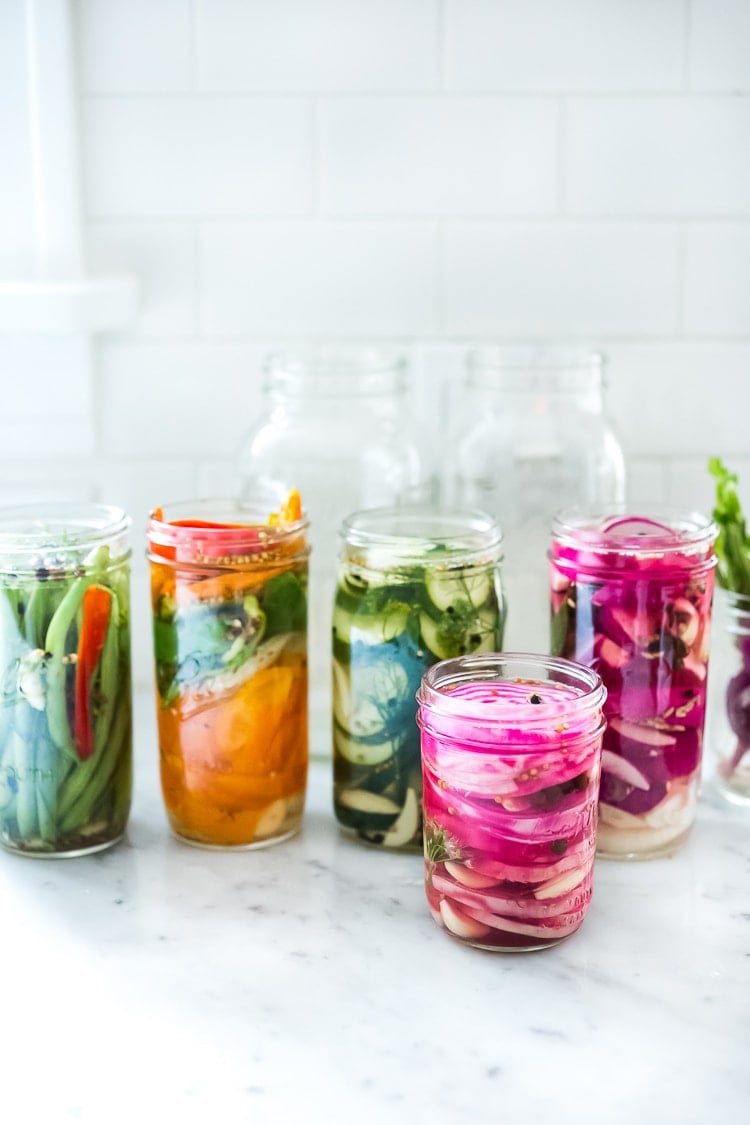
STEP FIVE
Refrigerate 12-24 hours. They will begin to have flavor the next day, and they will taste even better after a few days.
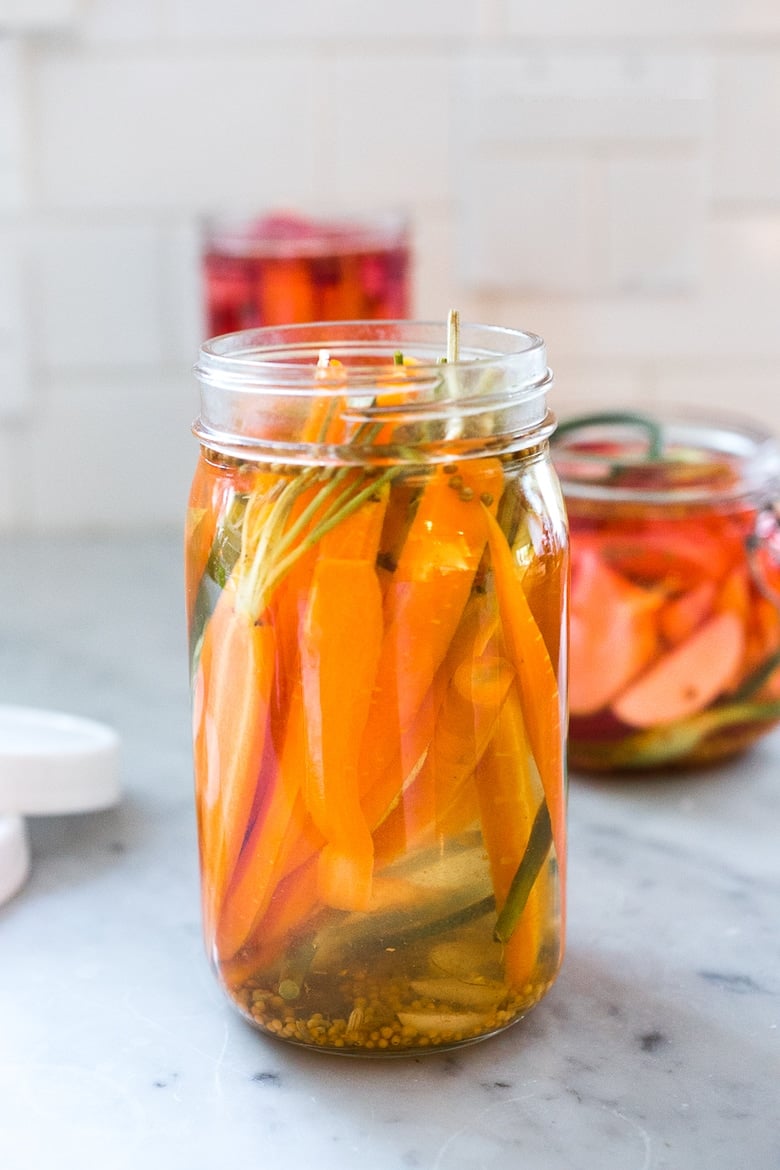
How Long Do Veggie Pickles Last?
These will keep up to 2 weeks in the fridge.
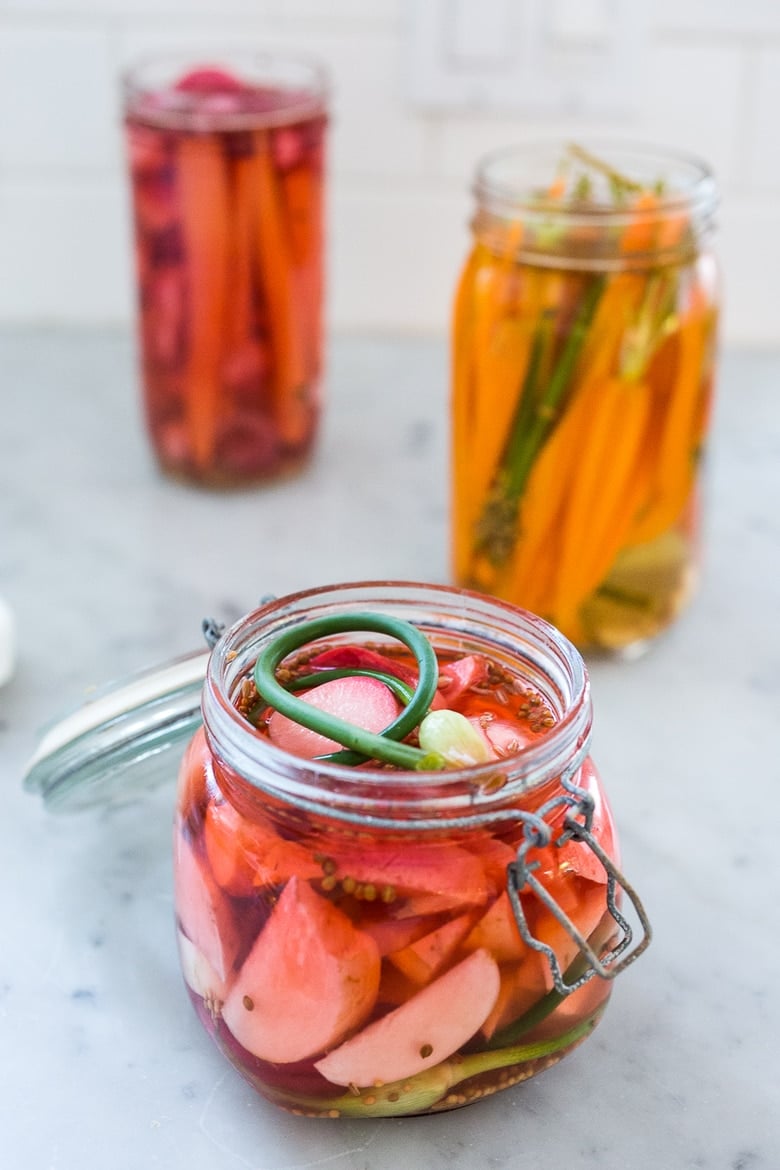
Other Pickles you may like
- If you are interested in pickling eggplant, here’s a tasty recipe for Moroccan Eggplant Pickles you may enjoy.
- Pickled Turnips are especially delicious with Middle Eastern food and I feature them here with my favorite recipe for homemade falafel and pita.
- Pickled peppers are great in sandwiches like this Falafel Burger (or any burger for that matter).
- Pickled Onions are a staple around here and we always have them on hand for tacos and sandwiches.
- Pickled summer squash are a way to extend the life of your zucchini
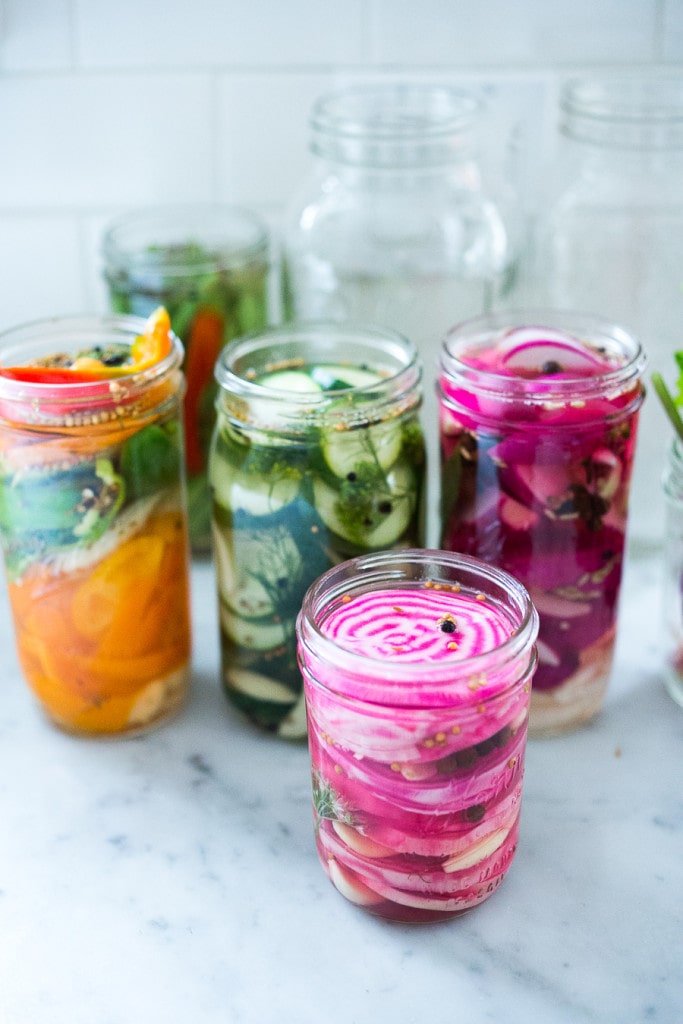
Enjoy these fun and easy refrigerator pickles!
xo
More PiCkling Recipes!
Love pickling and preserving? Here are more of our favorite recipes!
- Chow Chow
- Pickled Eggplant
- Pickled Red Onions
- Fermented Hot Sauce
- Easy Homemade Sauerkraut
- Tomato Confit
- How to make Preserved Lemons!
- Preserving Vegetables in Olive Oil
More from feasting at home
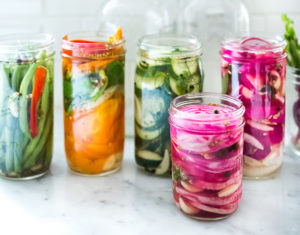
Quick Pickled Vegetables
- Prep Time: 15 mins
- Cook Time: 5 mins
- Total Time: 20 mins
- Yield: 2 Quarts
- Category: Pickled, Preserved , Snacks
- Method: Pickled
- Cuisine: Northwest
- Diet: Vegan
Description
Quick Pickled Vegetables – A simple, delicious recipe that can be used with any veggie! Beets, turnips, radishes, carrots, kohlrabi, onions, cauliflower, peppers, or green beans!
Ingredients
- Enough Fresh Raw Veggies to fill 2 Quart size mason Jars (about 5-6 cups)- cucumbers, beets, carrots, radishes, turnips, okra, green beans, asparagus, red onion, zucchini or summer squash, cauliflower florets, bell peppers, garlic scapes, fennel bulbs, rainbow chard stems
- 1 tablespoon coriander seeds
- 2 teaspoons fennel seeds
- 1 teaspoon mustard seeds
- 6- 10 cloves garlic- sliced thickly
- 1/2 an onion sliced (optional)
- few sprigs of fresh dill (optional) or other herbs
- Other optional additions- whole cloves, dill seeds, whole allspice, fresh ginger slices, fresh chilies or chili flakes, celery seeds, peppercorns, cumin seeds, star anise, other fresh herbs.
- 2 cups vinegar- white vinegar, red wine, rice wine, apple cider (any of these, or a combination)
- 2 cups water
- 2 tablespoons kosher salt
- 4-6 tablespoons sugar (or sugar alternative- remember, the sugar is added to balance the vinegar flavor, remember you won’t actually be consuming this.)
Instructions
- Prep your veggies. Wash them well and slice, quarter, or cut into spears, or leave whole ( like with green beans, asparagus, okra etc)
- Bring the water, vinegar, salt and sugar to a boil in a small pot, and in the meantime pack the jars with the prepped veggies.
- In two quart-size mason jars, divide the garlic and whole spices.
- Begin adding the veggies and if you are including the onion ( which I recommend), layer a few slices in with the veggies along with any fresh herbs you would like to include ( you can also layer the garlic this way too, or put it in first, your choice) leaving about an inch at the top of the jar.
- Using a funnel, carefully pour the hot liquid into the jars, making sure to submerge all the veggies, pressing down on them with the end of a wooden spoon. You may be able to add more veggies at this point, just make sure the liquid completely covers the veggies leaving at least a half-inch of room between the liquid and lid.
- Let sit on the counter to cool, and after an hour or two, cover and place in the fridge. These will taste good after 8-12 hours- but much better after a couple of days.
Notes
These keep up to 2 weeks in the fridge.
If pickling firmer veggies like carrots or beets, feel free to simmer the veggies in the pickling liquid (in a pot) for a 1-2 minutes to soften them slightly. Don’t overcook them!
If you are planning to can your pickles for long-term storage, bring a large pot of water to a boil and sterilize 2 wide-mouth pint jars and their metal lids.
Place the pickling liquid in saucepan over high heat and bring to a rolling boil. Pour the brine over the veggies filling each jar to within 1/2-inch of the top. Remove any air bubbles. Gently tap the jars against the counter a few times to remove all the air bubbles. Top off with more pickling liquid if necessary. Tighten the lids. Place the lids over the jars and screw on the rings until tight. For longer storage, place the filled jars in a boiling pot of water to can them. When the water comes back to a boil, boil the filled jars for 5 minutes then remove the jars immediately. Make sure the lids pop down.
Nutrition
- Serving Size: ½ cup – based on cucumber
- Calories: 13
- Sugar: 1.8 g
- Sodium: 291.7 mg
- Fat: 0.1 g
- Saturated Fat: 0 g
- Carbohydrates: 3 g
- Fiber: 0.3 g
- Protein: 0.4 g
- Cholesterol: 0 mg
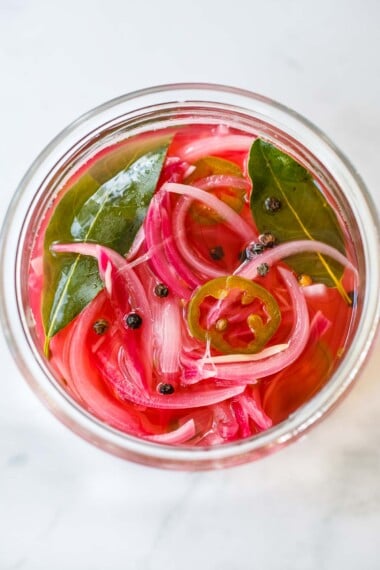
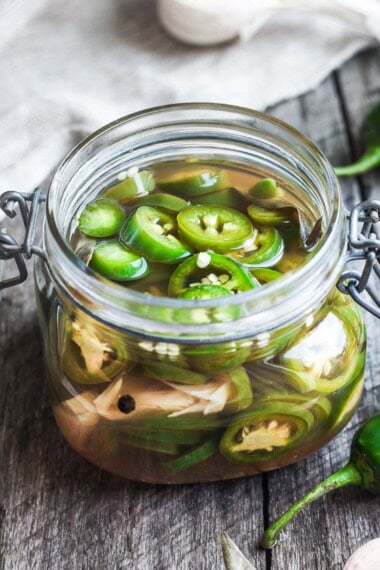
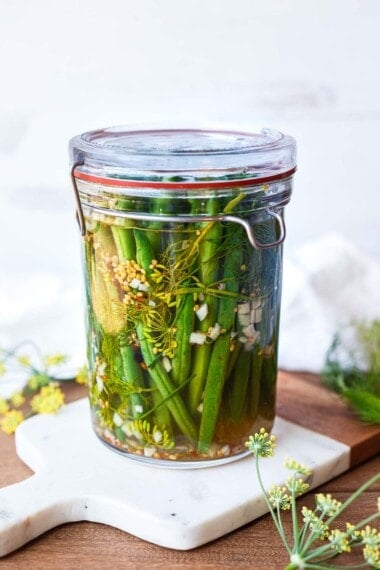
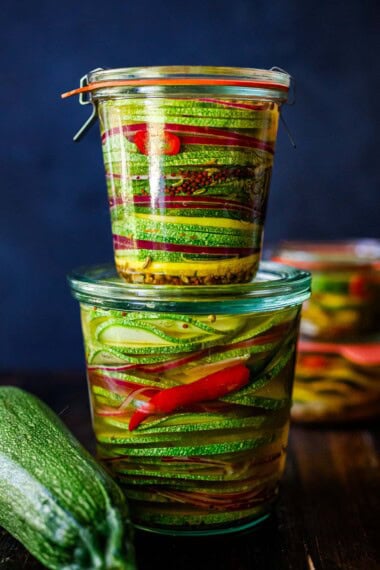
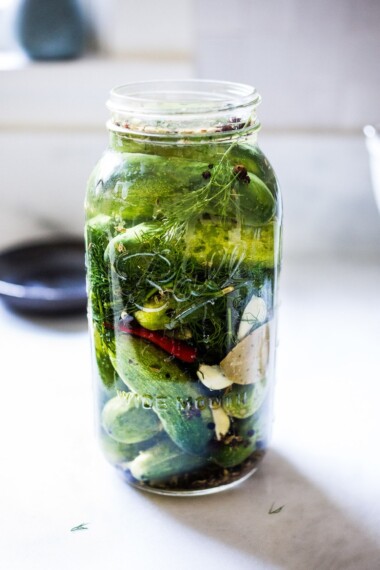
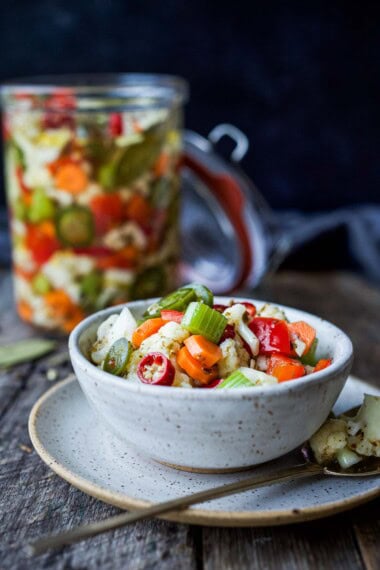
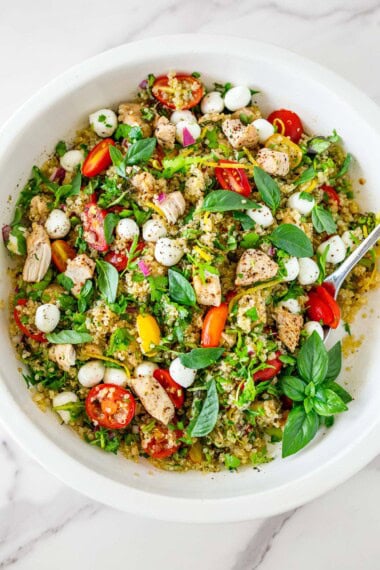
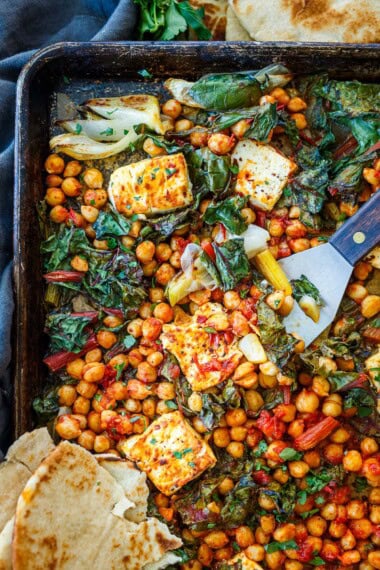
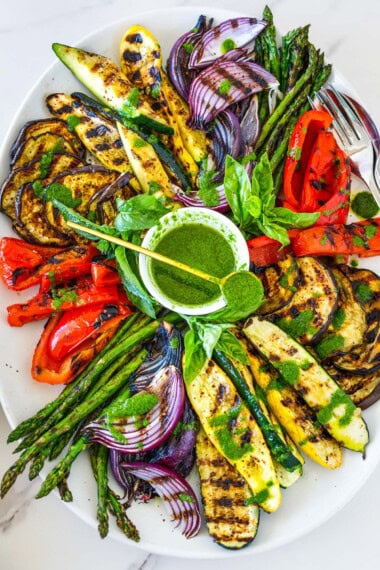

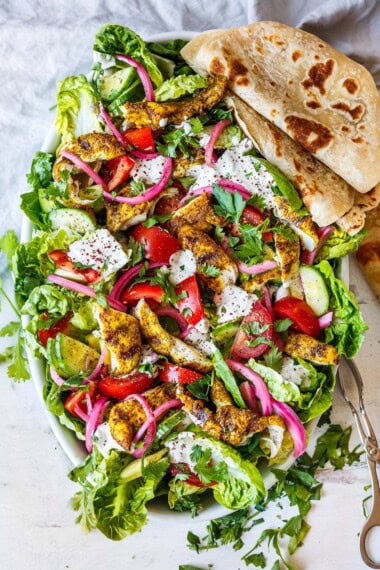
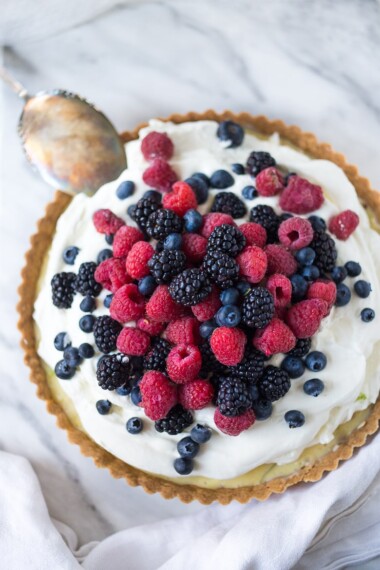
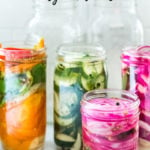
thank you
🙂
Why the difference in size of jars if planning on canning for long-term storage? For short-term, the jar is quart sized, but for long-term it is pint sized and only two jars, rather than the expected four if the recipe filled two quarts. Either way, I am going to try this soon.
I just used the jars I had n hand. Of course, feel free to use what you like Joanne!
Easy and so yummy
You listed one ingredient I have not seen in any other recipe. It adds flavour, zest and love to your food and makes cook more enjoyable for sure. It will elevate your ability to flavour your food………. You added music to your recipe!!!!!!! Music changes everything from a bad mood, feeling sad, to and flavour to your cooking. Tagged and saved, thanks 👍
Hello, great recipe – I will use that this summer when I have a glut of veggies in the garden ! I wondered, though, about the type of jar lids. In the past I have had metal lids react with the vinegar and go rusty and I wondered what type you used ? Thanks !
Also currently got chickpeas soaking to make your authentic falafel – can’t wait !
Ball makes a plastic reusable lid, or you can put a piece of wax paper on the jar before you put the lid on. Yay for falafels!
Great simple recipe, easily adaptable. Works well. Green beans my new favourite. Thanks
Thanks Wayne, I am glad you happy with it! And thank you for circling back and rating this for us. Very Appreciated!
These were delicious, easy, and fun to make. I made carrot with ginger slices, mustard seeds, and tarragon; bell pepper with fennel seed garlic and oregano; and green bean with garlic, dill seed, and dill. All of them were good, but I wish there was a way to keep the beans bright green. Thanks for a great recipe!
Blanching first can help keep the beans brighter, have you tried that?
I will try that next time. Thanks!
Thank you!!! This is the best recipe by far. The ratio of water to vinegar is what was missing from other recipes I’ve made. I love the spices! It just elevates the flavors.
Glad to hear this is working for you Marcela!